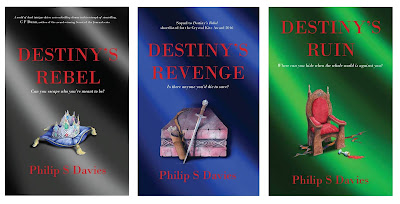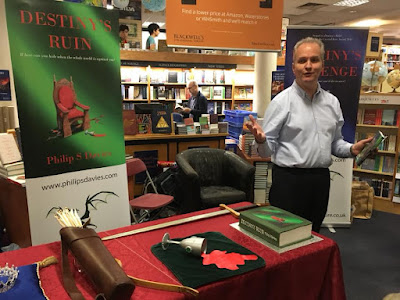GOING HYBRID: Philip S Davies
When his publisher packed up and went home during the pandemic, Philip S Davies was compelled down the self-publishing route. Words & Pictures invited him to share his experience of hybrid publishing.
When writers gather, the discussion will probably turn, before long, to the different routes to publication. It’s a hot topic because of the increasing variety of options open to us. I share my experiences here, not claiming to be an expert in it all, but simply to illustrate how it might go and how I view it now, having been through both the traditional and self-publishing options.
After writing my first Young Adult fantasy novel in 2009, it took me four years of submissions and rejections before a small traditional publisher, Books to Treasure, took me on. The first book did well enough for them to publish the other two in the trilogy between 2015 and 2018.
But in 2020 my publishing editor emigrated back to Australia, wound up her UK business, returned the publishing rights to me and my trilogy became effectively unavailable and out-of-print. To make them available again, my pandemic lockdown project was to teach myself how to re-issue them as eBooks and paperbacks using Amazon’s Kindle Direct Publishing (KDP).
My self-published copies, with some props I use at schools and events.
1. Affirmation and Credibility
This is the big one for many aspiring authors, that we want to have our writing endorsed by a professional company who will put their money and expertise behind getting our work out there. It is still the case that self-publishing is seen as a second-best option in the eyes of many, notably bookshops, libraries, schools and others in the writing community, mainly because the quality of too many self-published books is not of a high enough professional standard.
2. Access
There are endless tales of how difficult it is to secure a traditional publishing contract and they are correct, particularly with the current backlog of delayed book releases after the pandemic. We may be one of the lucky few to land a literary agent and commercial publisher within a year or two of trying but most spend many years in the submission, rejection and waiting game, with the sad reality that some never succeed with this route at all.
By contrast, self-publishing is open to all and does not need to be a last resort or only followed when we resign ourselves to having failed in the “proper”, traditional route. Some authors consciously choose to self-publish, without even trying traditional publishing, for the reasons I mention below.
3. Control
New authors are often surprised that a traditional contract normally hands over to the publisher the final say on the book title, editing, cover design, price, marketing and various other rights. The bottom line is that if we want to keep hold of the final say over everything with regard to our precious baby, then we should self-publish.
4. Speed
It is often a couple of years between signing a publishing contract and a book’s release date. We may think it has already taken us long enough to secure an agent and publisher, but these professionals have their own processes and timescales for all the books they’re working on and authors need to fit in with these. On the other hand, self-publishers can set their own pace and release their books as quickly – or as slowly and methodically – as they wish.
5. Cost
The big advantage of traditional publishing, (as well as the affirmation and credibility), is that we don’t have to pay for it. The money flows one way, from the publisher to the author, in royalties from sales, sometimes with an advance up front. That is unless we choose to purchase copies from them at a discounted price to sell at events ourselves.
There are low-cost self-publishing options (such as Amazon’s KDP) but if we wish to produce a quality product then we should not cut corners on editing, proof-reading, cover artwork, design, formatting and layout.
The cost factor is balanced up by royalty rates for self-published authors being much higher per book sold than through traditional publishers because fewer people are taking their cut of the proceeds. The actual income received through the two routes might be similar: more books sold with a lower royalty rate versus fewer books sold with higher royalties.
The book launch at Blackwell's, Oxford, for Destiny's Ruin in Sept 2018
6. Marketing and Sales
Long gone are the days when publishers did all the book promotion for authors and, whichever route we take, we should expect to market and sell our own work. Traditional publishers will certainly assist in the publicity efforts and will distribute the book, but all marketing budgets are reduced these days and the lion’s share of the promotion lies with the author. So, if we’re happy for our book to be a team effort, then traditional publishing is certainly a way to try and we will usually end up selling more books that way. On either route, however, the sales figures depend on not just the quality of the story and end product but also on us being a whizz, (or not), at book promotion on social media, websites, blogs, school visits, talks and events.
Which way now?
The acid test for me is which way will I choose for my next book, Cave of Immortality, written but not yet published? For me, the factors of control and speed are most important so I’ll probably choose to self-publish this new series without even trying the traditional route. To back this up I’ve coined a new saying.
You may be familiar with the old proverb:
Give a man a fish and you feed him for a day.My writer’s version goes like this:
Teach a man to fish and you feed him for a lifetime.
Publish something for a writer and you give them a book.
Teach a writer to publish their own books and you give them a career.
*Header image: Destiny's Rebel trilogy book covers. All images courtesy of Philip S Davies
*
Website is: philipsdavies.com Twitter: revpsdavies
*
Fran Price is Deputy Editor of Words & Pictures magazine. Contact: deputyeditor@britishscbwi.org













No comments:
We love comments and really appreciate the time it takes to leave one.
Interesting and pithy reactions to a post are brilliant but we also LOVE it when people just say they've read and enjoyed.
We've made it easy to comment by losing the 'are you human?' test, which means we get a lot of spam. Fortunately, Blogger recognises these, so most, if not all, anonymous comments are deleted without reading.